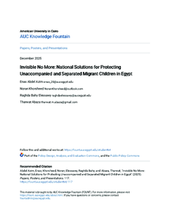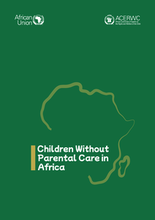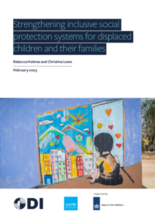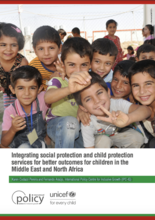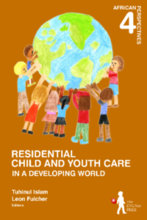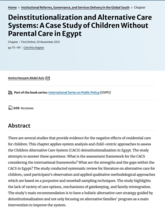childrens_living_arrangement
Displaying 1 - 10 of 33
This policy paper examines Egypt’s protection framework for unaccompanied and separated migrant children, highlighting both significant recent advances, such as national SOPs, a new asylum law, and expanded residence permits, and persistent challenges related to legal visibility, registration delays, and service access. It proposes actionable reforms to strengthen legal, administrative, and service systems, including expanding family-based alternative care to migrant and refugee children, developing child-friendly asylum procedures, and better integrating NGO, refugee-led, and community-based support into state structures.
On October 23, 2025, the Transforming Children’s Care Collaborative hosted a webinar exploring Kafaalah—a long-standing childcare practice in Muslim communities that has been observed for more than 1,400 years.
This piece examines persistent gaps in Egypt’s Kafala system for children deprived of parental care, highlighting the lack of disaggregated data on children, foster families, and care homes.
The African Committee of Experts on the Rights and Welfare of the Child (ACERWC/the Committee), in collaboration with African Union Member States, partner organizations, children and young people, launches the first of its kind Continental Study on Children Without Parental Care (CWPC) in Africa. The study, conducted from 2020 to 2022, amid the COVID-19 pandemic, covered over 43 countries in the five regions of Africa.
Authored by the ODI in partnership with UNICEF, this paper assesses the benefits of inclusive social protection from a displacement and child-centred perspective.
This research report, developed by the IPC-IG and the UNICEF MENA Regional Office for Middle East and North Africa, presents five case studies that demonstrate how integrated social protection and child protection systems enhance efficiency, especially of the social service workforce, and improve socio-economic and child outcomes: Tunisia, Morocco, Iraq, Egypt, and Brazil.
A court in Egypt has sentenced a media tycoon with close links to the government to three years in jail for his involvement in human trafficking and the indecent assault of underage girls at an orphanage he founded.
यस अध्ययनले सातवटा केन्द्रित देशहरूमा २१ अर्ध-संरचित अन्तर्वार्ताहरू समावेश गरी गुणस्तरीय अनुसन्धान अध्ययन सञ्चालन गरेर निजी रूपमा सञ्चालित र वित्त पोषित आवासीय हेरचाह संस्थाहरूको सानो संख्यामा COVID-19 को प्रभावको अन्वेषण गर्दछ।
This is a comprehensive collection offering accounts of “first hand” lived experiences of young people growing up in some form of residential child and youth care in 19 African countries.
There are several studies that provide evidence for the negative effects of residential care for children. This chapter applies system analysis and child-centric approaches to assess the Children Alternative Care System (CACS) deinstitutionalization in Egypt.

